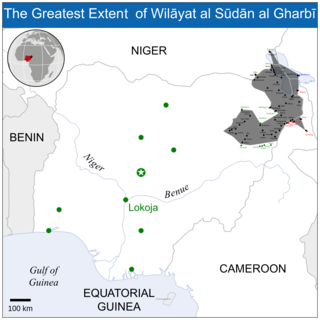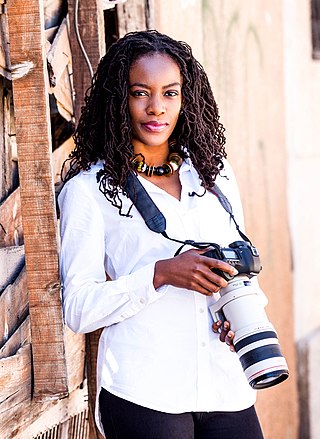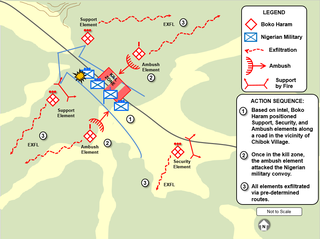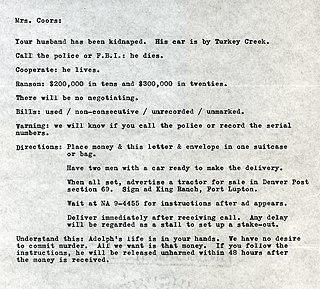Related Research Articles

Goodluck Ebele Azikiwe Jonathan is a Nigerian politician who served as the President of Nigeria from 2010 to 2015. He lost the 2015 presidential election to former military head of state General Muhammadu Buhari, and was the first incumbent president in Nigerian history to concede defeat in an election. Prior to that, he served as Vice President of Nigeria from 2007 to 2010 under the administration of Umaru Musa Yar'Adua; and in oil-rich Bayelsa State as Governor of Bayelsa State from 2005 to 2007.

Boko Haram, officially known as Jamā'at Ahl as-Sunnah lid-Da'wah wa'l-Jihād, is an Islamist militant organization based in northeastern Nigeria, which is also active in Chad, Niger, northern Cameroon, and Mali. Boko Haram was the world's deadliest terror group during part of the mid-2010s according to the Global Terrorism Index. In 2016, the group split, resulting in the emergence of a hostile faction known as the Islamic State's West Africa Province.
Chibok is a Local Government Area of Borno State, Nigeria, located in the southern part of the state. It has its headquarters in the town of Chibok.

The Boko Haram insurgency began in July 2009, when the militant Islamist and jihadist rebel group Boko Haram started an armed rebellion against the government of Nigeria. The conflict is taking place within the context of long-standing issues of religious violence between Nigeria's Muslim and Christian communities, and the insurgents' ultimate aim is to establish an Islamic state in the region.

The Vanguard for the Protection of Muslims in Black Africa, better known as Ansaru and less commonly called al-Qaeda in the Lands Beyond the Sahel, is an Islamic fundamentalist Jihadist militant organisation based in the northeast of Nigeria. It originated as a faction of Boko Haram, but became officially independent in 2012. Despite this, Ansaru and other Boko Haram factions continued to work closely together until the former increasingly declined, and stopped its insurgent activities in 2015. Since then, Ansaru is mostly dormant though its members continue to spread propaganda for their cause.
Timeline of the Boko Haram insurgency is the chronology of the Boko Haram insurgency, an ongoing armed conflict between Nigerian Islamist group Boko Haram and the Nigerian government. Boko Haram have carried out many attacks against the military, police and civilians since 2009, mostly in Nigeria. The low-intensity conflict is centred on Borno State. It peaked in the mid 2010s, when Boko Haram extended their insurgency into Cameroon, Chad and Niger.

On the night of 14–15 April 2014, 276 mostly Christian female students aged from 16 to 18 were kidnapped by the Islamic terrorist group Boko Haram from the Government Girls Secondary School at the town of Chibok in Borno State, Nigeria. Prior to the raid, the school had been closed for four weeks due to deteriorating security conditions, but the girls were in attendance in order to take final exams in physics.

The Sambisa Forest is a forest in Borno State, northeast Nigeria. It is in the southwestern part of Chad Basin National Park, about 60km southeast of Maiduguri, the capital of Borno State. It has an area of 518 km².
On the night of 5-6 May 2014, Boko Haram militants attacked the twin towns of Gamboru and Ngala in Borno State, northeastern Nigeria. About 310 residents were killed in the 12-hour massacre, and the town was largely destroyed.
The following lists events from 2014 in Nigeria.

Starting in late January 2015, a coalition of West African troops launched an offensive against the Boko Haram insurgents in Nigeria.

Chikaodinaka Sandra Oduah is a Nigerian-American journalist who has worked as a television news producer, correspondent, writer and photographer. She is currently a correspondent for VICE News. Known for her unique human-focused ethnographic reporting style with an anthropological approach, she was awarded a CNN Multichoice African Journalist Award in 2016. Upon the abduction of 276 schoolgirls by the terrorist group Boko Haram in Chibok, northeastern Nigeria, she was the first international journalist to visit and spend extensive time in the remote community of Chibok. Her thorough and exclusive coverage of the mass kidnapping won her the Trust Women "Journalist of The Year Award" from the Thomson Reuters Foundation in 2014. Oduah's reporting explores culture, history, conflict, human rights, and development to capture the complexities, hopes and everyday realities of Africans and people of African descent.
Amina Ali Nkeki is a Nigerian former hostage of Boko Haram. She was one of 276 female students the group kidnapped from Chibok in 2014. After 57 of the girls escaped in the first few months, the remaining 219 were held for several years. Of this larger group, Ali was the first freed. She was found on 17 May 2016 by Civilian Joint Task Force along with a four-month-old child and an alleged Boko Haram member, Mohammed Hayatu, who described himself as her husband. All three were severely malnourished.

Operation Turus is the code name of the British military operation to assist Nigeria during the Boko Haram insurgency. It was launched in April 2014 by Prime Minister David Cameron in response to the Chibok schoolgirls kidnapping which saw over a hundred schoolgirls kidnapped by Boko Haram, a jihadist terrorist organisation in norteastern Nigeria. Initial efforts were focused on the search for the missing schoolgirls, with the UK deploying military specialists, satellite imagery and reconnaissance aircraft from the Royal Air Force. According to a source quoted in the The Observer, the UK successfully located the missing schoolgirls and offered to rescue them but this offer was rejected by the Nigerian government which considered it a national issue. Most of the schoolgirls remain missing.
On February 19, 2018, at 5:30 pm, 110 schoolgirls aged 11–19 years old were kidnapped by the Boko Haram terrorist group from the Government Girls' Science and Technical College (GGSTC). Dapchi is located in Bulabulin, Bursari Local Government area of Yobe State, in the northeast part of Nigeria. The federal government of Nigeria deployed the Nigerian Air Force and other security agencies to search for the missing schoolgirls and to hopefully enable their return. The governor of Yobe State, Ibrahim Gaidam, blamed Nigerian Army soldiers for having removed a military checkpoint from the town. Dapchi lies approximately 275 km northwest of Chibok, where over 276 schoolgirls were kidnapped by Boko Haram in 2014.

The Chibok ambush was an attack of Boko Haram insurgents against a Nigerian Army convoy in the night from 13 to 14 May 2014, as the latter was searching for schoolgirls who had been kidnapped by the Islamist rebels. Even though the Nigerian Army forces managed to extricate themselves from the ambush, the attack seriously affected the morale of the involved soldiers who felt that their leadership was carelessly sacrificing them in the war against the insurgents. As result, elements of the Nigerian Army's 7th Division subsequently mutinied at Maiduguri and almost killed their own commander, "humiliat[ing] the Nigerian military".
Stephanie Busari is a Nigerian journalist notable for exclusively obtaining the "proof of life" video for the missing Chibok schoolgirls in the wake of the Bring Back Our Girls advocacy which led to negotiations with Boko Haram that resulted in the release of over 100 of the kidnapped schoolgirls.

Kidnapping is a major problem in Nigeria in the early 21st century. Kidnapping by bandits and insurgents is among the biggest organised or gang crime in Nigeria and is a national security challenge.
During the evening of 11 December 2020, over 300 pupils were kidnapped from a boys' secondary boarding school on the outskirts of Kankara, Katsina State, northern Nigeria. A gang of gunmen on motorcycles attacked the Government Science Secondary School, where more than 800 pupils reside, for over an hour.
Audu Bulama Bukarti is a prominent Nigerian analyst, social critique, public intellectual and human rights lawyer.
References
- ↑ "Yvonne Ndege". BBC News. 30 April 2003. Retrieved 1 May 2011.
- ↑ "AJ.English profile".